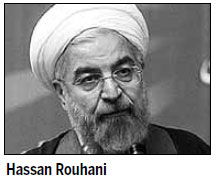Iranian President Hassan Rouhani said on Sunday his country has nothing to offer except transparency in nuclear talks with world powers, rebuffing hard-liners as negotiators seek a final deal over the Islamic Republic's contested program.
The talks, resuming on Tuesday, face an informal July deadline to hammer out a final deal to limit Iran's ability to build nuclear arms in exchange for ending the crippling economic sanctions it faces. While the moderate Rouhani and Iran's negotiators have the backing of Supreme Leader Ayatollah Ali Khamenei, hard-liners increasingly criticize the deal as giving up too much while gaining too little from the West.
Speaking on Sunday to a group of Iranian medical and nuclear experts, Rouhani appeared to be trying to counter the hard-liners by saying Iran would never accept "scientific and nuclear apartheid" by giving up its program.
"We have nothing to put on the table and offer to them but transparency. That's it. Our nuclear technology is not up for negotiation," Rouhani, referring to the West, said in remarks broadcast on state television.
"Iran will not retreat one step in the field of nuclear technology. ... We will not accept nuclear apartheid," he said.
"If the world seeks good relations with Iran, it should choose the way of surrendering to Iran's rights, respecting the Iranian nation and praising Iranian scientists," Rouhani said.

Rouhani also stressed that Iran has not sought nuclear weapons and urged the West not to accuse Iran of doing so.
"The Iranian nation has never been after weapons of mass destruction since it does not see it as legitimate," he said.
The West says Iran's nuclear program could allow it to build atomic weapons. Iran says its program is for peaceful purposes, such as medical research and power generation.
Iran reached a historic interim deal in November with six world powers - the United States, Russia, China, Britain, France and Germany. In it, Teheran agreed to stop uranium enrichment of up to 20 percent - which is a possible pathway to nuclear arms - in exchange for the easing of some Western sanctions. It agreed to dilute half of its 20 percent enriched uranium into 5 percent and turn the remaining half into oxide, which is very difficult to be used for bomb-making materials.
It also allowed international inspectors into nuclear sites. In the last week, inspectors from the International Atomic Energy Agency, the United Nations watchdog, visited a uranium mine and a uranium-thickening facility in the central Iranian towns of Ardakan and Yazd. Iranian officials said that fulfilled a series of demands it had for Iran, including releasing information about its efforts to develop a type of explosive detonator that can be used in nuclear weapons.
AP-AFP
